【英语】初中英语现在完成时专题训练答案
- 格式:doc
- 大小:78.00 KB
- 文档页数:8
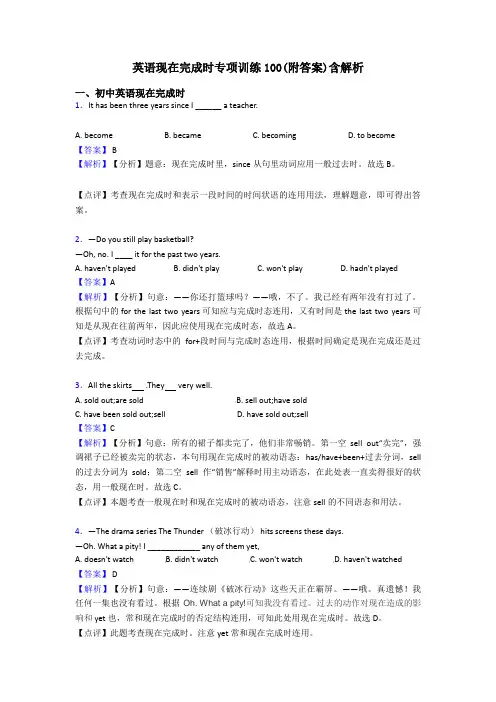
英语现在完成时专项训练100(附答案)含解析一、初中英语现在完成时1.It has been three years since I ______ a teacher.A. becomeB. becameC. becomingD. to become【答案】 B【解析】【分析】题意:现在完成时里,since从句里动词应用一般过去时。
故选B。
【点评】考查现在完成时和表示一段时间的时间状语的连用用法,理解题意,即可得出答案。
2.—Do you still play basketball?—Oh, no. I ____ it for the past two years.A. haven't playedB. didn't playC. won't playD. hadn't played【答案】A【解析】【分析】句意:——你还打篮球吗?——哦,不了。
我已经有两年没有打过了。
根据句中的for the last two years可知应与完成时态连用,又有时间是the last two years可知是从现在往前两年,因此应使用现在完成时态,故选A。
【点评】考查动词时态中的for+段时间与完成时态连用,根据时间确定是现在完成还是过去完成。
3.All the skirts .They very well.A. sold out;are soldB. sell out;have soldC. have been sold out;sellD. have sold out;sell【答案】C【解析】【分析】句意:所有的裙子都卖完了,他们非常畅销。
第一空sell out“卖完”,强调裙子已经被卖完的状态,本句用现在完成时的被动语态:has/have+been+过去分词,sell 的过去分词为sold;第二空sell作“销售”解释时用主动语态,在此处表一直卖得很好的状态,用一般现在时。
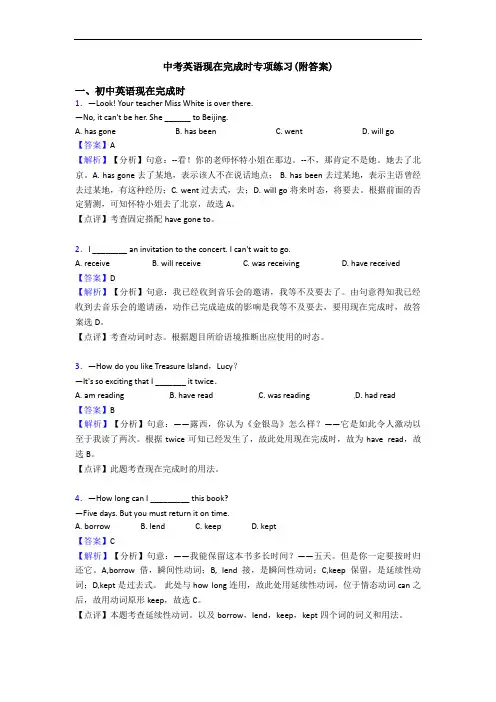
中考英语现在完成时专项练习(附答案)一、初中英语现在完成时1.—Look! Your teacher Miss White is over there.—No, it can't be her. She ______ to Beijing.A. has goneB. has beenC. wentD. will go【答案】A【解析】【分析】句意:--看!你的老师怀特小姐在那边。
--不,那肯定不是她。
她去了北京。
A. has gone去了某地,表示该人不在说话地点; B. has been去过某地,表示主语曾经去过某地,有这种经历;C. went过去式,去;D. will go将来时态,将要去。
根据前面的否定猜测,可知怀特小姐去了北京,故选A。
【点评】考查固定搭配have gone to。
2.I ________ an invitation to the concert. I can't wait to go.A. receiveB. will receiveC. was receivingD. have received【答案】D【解析】【分析】句意:我已经收到音乐会的邀请,我等不及要去了。
由句意得知我已经收到去音乐会的邀请函,动作已完成造成的影响是我等不及要去,要用现在完成时,故答案选D。
【点评】考查动词时态。
根据题目所给语境推断出应使用的时态。
3.—How do you like Treasure Island,Lucy?—It's so exciting that I _______ it twice.A. am readingB. have readC. was readingD. had read【答案】B【解析】【分析】句意:——露西,你认为《金银岛》怎么样?——它是如此令人激动以至于我读了两次。
根据twice可知已经发生了,故此处用现在完成时,故为have read,故选B。
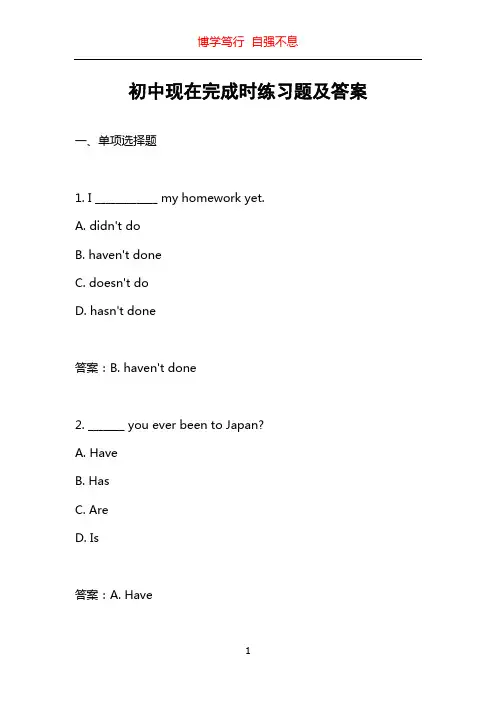
初中现在完成时练习题及答案一、单项选择题1. I ____________ my homework yet.A. didn't doB. haven't doneC. doesn't doD. hasn't done答案:B. haven't done2. _______ you ever been to Japan?A. HaveB. HasC. AreD. Is答案:A. Have3. Sarah _________ books at the library.A. had readB. had been readingC. has readD. has been reading答案:C. has read4. We _________ each other since last week.A. didn't seeB. haven't seenC. haven't been seeingD. doesn't see答案:B. haven't seen5. _______ you ever _______ surfing?A. Did, goB. Have, wentC. Have, goneD. Did, gone答案:C. Have, gone二、完形填空题It has been a different world without our dear friend, Oscar. We __6__ him since we were eight-years-old. Oscar was a great friend and an amazing person. He __7__ us to be much better people.Last summer, Oscar fell terribly ill. He __8__ in the hospital for a few weeks, but unfortunately, he __9__ his battle with the illness and __10__ away.Since Oscar's death, we __11__ daily memories of our time with him. We __12__ how he always had something positive to say, no matter what. Oscar __13__ inspired us to be positive and kind, even in difficult times.We have been __14__ for several therapy sessions as a group, and it has really helped us __15__ with the loss of our friend. We __16__ that accepting the loss is a process, and it takestime to heal. But we are __17__ grateful for the time we had with Oscar and the memories we __18__ with him.Oscar's __19__ and laughter is greatly missed, but his __20__ will forever be in our hearts.6. A. knowB. have knownC. knewD. known答案:B. have known7. A. haveB. hasC. hadD. having答案:C. had8. A. wereB. has beenC. hasD. had been答案:D. had been9. A. losesB. lossC. loosesD. lost答案:D. lost10. A. passB. passedC. passingD. passes答案:B. passed11. A. rememberB. rememberedC. remembersD. have remembered答案:B. remembered12. A. alwaysB. usuallyC. sometimesD. never答案:A. always13. A. yetB. alreadyC. alsoD. always答案:D. always14. A. goB. goesC. goneD. going答案:A. go15. A. copeB. copingC. copedD. have coped 答案:B. coping16. A. knowB. knewC. knownD. knowing答案:C. known17. A. tooB. veryC. soD. really答案:D. really18. A. madeB. makeC. have madeD. making答案:C. have made19. A. joyfulB. happinessC. joyfulD. joy答案:D. joy20. A. friendshipB. friendC. friendsD. friendly答案:C. friends三、阅读理解题Emma has always been interested in photography. For her13th birthday, her parents bought her a camera and she has been taking photos ever since.In the past year, Emma has taken over 10,000 photos. She has traveled to different places and captured the beauty around her. She has photographed stunning landscapes, cute animals, and even her friends and family. Emma has discovered that the more she practices, the better her photos turn out.Emma has also created an online portfolio of her photos. She has received positive feedback from friends and strangers alike. Some people have even contacted her asking if they can purchase prints of her photos.Recently, Emma entered a photography contest. The theme was \。
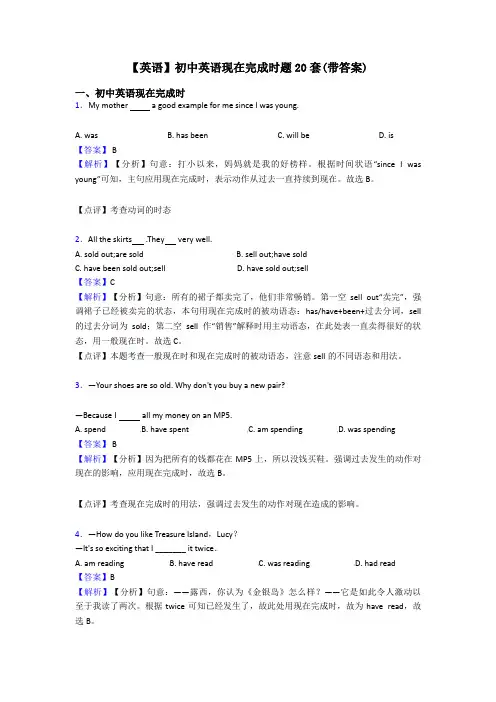
【英语】初中英语现在完成时题20套(带答案)一、初中英语现在完成时1.My mother a good example for me since I was young.A. wasB. has beenC. will beD. is【答案】 B【解析】【分析】句意:打小以来,妈妈就是我的好榜样。
根据时间状语“since l was young”可知,主句应用现在完成时,表示动作从过去一直持续到现在。
故选B。
【点评】考查动词的时态2.All the skirts .They very well.A. sold out;are soldB. sell out;have soldC. have been sold out;sellD. have sold out;sell【答案】C【解析】【分析】句意:所有的裙子都卖完了,他们非常畅销。
第一空sell out“卖完”,强调裙子已经被卖完的状态,本句用现在完成时的被动语态:has/have+been+过去分词,sell 的过去分词为sold;第二空sell作“销售”解释时用主动语态,在此处表一直卖得很好的状态,用一般现在时。
故选C。
【点评】本题考查一般现在时和现在完成时的被动语态,注意sell的不同语态和用法。
3.—Your shoes are so old. Why don't you buy a new pair?—Because I all my money on an MP5.A. spendB. have spentC. am spendingD. was spending【答案】 B【解析】【分析】因为把所有的钱都花在MP5上,所以没钱买鞋。
强调过去发生的动作对现在的影响,应用现在完成时,故选B。
【点评】考查现在完成时的用法,强调过去发生的动作对现在造成的影响。
4.—How do you like Treasure Island,Lucy?—It's so exciting that I _______ it twice.A. am readingB. have readC. was readingD. had read【答案】B【解析】【分析】句意:——露西,你认为《金银岛》怎么样?——它是如此令人激动以至于我读了两次。
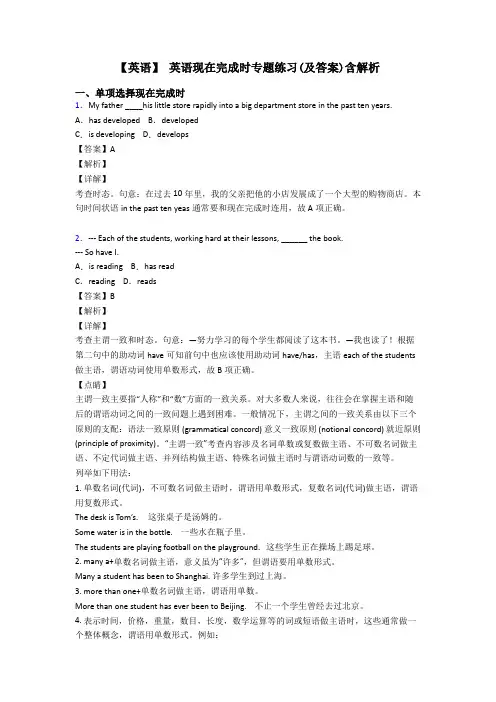
【英语】英语现在完成时专题练习(及答案)含解析一、单项选择现在完成时1.My father ____his little store rapidly into a big department store in the past ten years. A.has developed B.developedC.is developing D.develops【答案】A【解析】【详解】考查时态。
句意:在过去10年里,我的父亲把他的小店发展成了一个大型的购物商店。
本句时间状语in the past ten yeas通常要和现在完成时连用,故A项正确。
2.--- Each of the students, working hard at their lessons, ______ the book.--- So have I.A.is reading B.has readC.reading D.reads【答案】B【解析】【详解】考查主谓一致和时态。
句意:—努力学习的每个学生都阅读了这本书。
—我也读了!根据第二句中的助动词have可知前句中也应该使用助动词have/has,主语each of the students 做主语,谓语动词使用单数形式,故B项正确。
【点睛】主谓一致主要指“人称”和“数”方面的一致关系。
对大多数人来说,往往会在掌握主语和随后的谓语动词之间的一致问题上遇到困难。
一般情况下,主谓之间的一致关系由以下三个原则的支配:语法一致原则 (grammatical concord) 意义一致原则 (notional concord) 就近原则(principle of proximity)。
“主谓一致”考查内容涉及名词单数或复数做主语、不可数名词做主语、不定代词做主语、并列结构做主语、特殊名词做主语时与谓语动词数的一致等。
列举如下用法:1. 单数名词(代词),不可数名词做主语时,谓语用单数形式,复数名词(代词)做主语,谓语用复数形式。
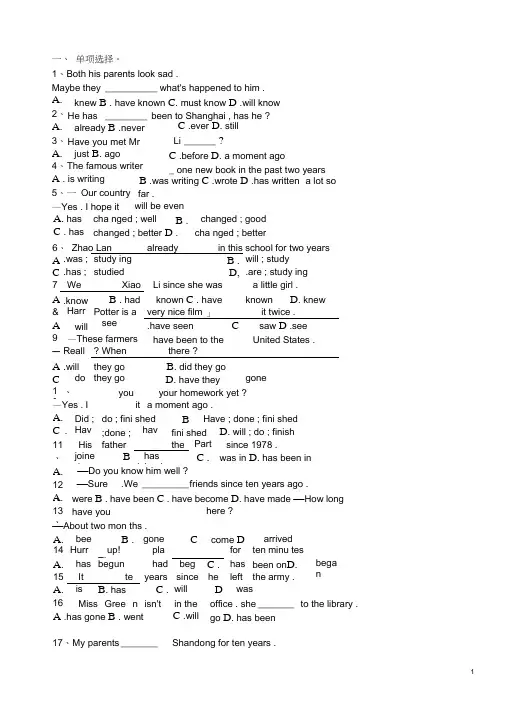
一、 单项选择。
1、Both his parents look sad .Maybe they __________ what's happened to him .knew B . have known C . must know D .will knowHe has ________ been to Shanghai , has he ?already B .never Have you met Mr just B . agoA . 2、A . 3、 A . 4、 T he famous writer A . is writing 5、 一 Our country —Yes . I hope it C .ever D . still Li ______ ?C .beforeD . a moment ago _ one new book in the past two yearsA . has C . hasB .was writingC .wroteD .has written a lot sofar . will be evenB . 6、 Zhao Lan already in this school for two yearsA .was ; study ingB . will ; studyC .has ; studied D, .are ; study ing7、We Xiao Li since she was a little girl .A .knowB . had knownC . have knownD . knew& Harr y Potter is a very nice film 」 it twice .A will see.have seen C saw D .see9、 —These farmers have been to the United States .—— Reall y? When there ?A .will they goB . did they goC do they goD . have they gone10、 you your homework yet ?—Yes . I it a moment ago .changed ; goodcha nged ; betterA . C . 11、 A . 12、 cha nged ; well changed ; better D . Did ; do ; fini shedB Have ; done ; fini shedHav e ;done ; hav e fini shed D . will ; do ; finishHis fatherthe Part y since 1978 .joined B . has joinedC . was inD . has been in—Do you —Sure know him well ? .We _________ f riends since ten years ago .were B . have been C . have become D . have made —How longhave you A . 13、 A . bee n B . gone C comeD arrived14、 Hurr y up! The pla y for ten minu tesA . has begunB . had beg unC . has been on D. 15、 It te n years since he left the army . A . is B . has C . will D washere ?began16、 —About two mon ths . Miss Gree n isn't A .has gone B . went in the C .will office . she _______ to the library .go D . has been17、My parents _______ Shandong for ten years .A . have been inB . have been to三、 汉译英。
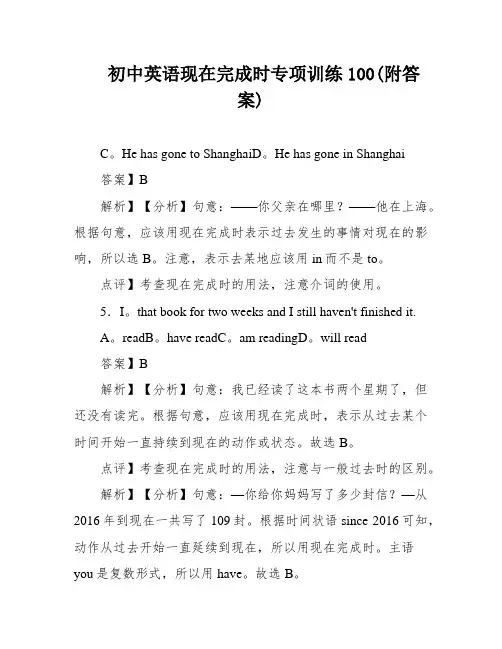
初中英语现在完成时专项训练100(附答案)C。
He has gone to ShanghaiD。
He has gone in Shanghai答案】B解析】【分析】句意:——你父亲在哪里?——他在上海。
根据句意,应该用现在完成时表示过去发生的事情对现在的影响,所以选B。
注意,表示去某地应该用in而不是to。
点评】考查现在完成时的用法,注意介词的使用。
5.I。
that book for two weeks and I still haven't finished it.A。
readB。
have readC。
am readingD。
will read答案】B解析】【分析】句意:我已经读了这本书两个星期了,但还没有读完。
根据句意,应该用现在完成时,表示从过去某个时间开始一直持续到现在的动作或状态。
故选B。
点评】考查现在完成时的用法,注意与一般过去时的区别。
解析】【分析】句意:—你给你妈妈写了多少封信?—从2016年到现在一共写了109封。
根据时间状语since 2016可知,动作从过去开始一直延续到现在,所以用现在完成时。
主语you是复数形式,所以用have。
故选B。
点评】本题考查现在完成时的用法。
注意主语为复数形式时,谓语动词也要用复数形式。
C。
have married。
married。
D。
have married。
have been married答案】B解析】【分析】句意:——玛丽,我记得你几年前结婚了。
——是的,我结婚已经3年了。
根据时间状语several yearsago和答句中的for 3 years可以确定是过去的事情,所以用过去式married。
又因为答句中没有强调持续性,所以用一般过去时,故选B。
注意have married和have been married的区别,前者表示已经结婚了,后者表示结婚已经持续了一段时间。
Yes。
I do。
I _______ them every day.A。
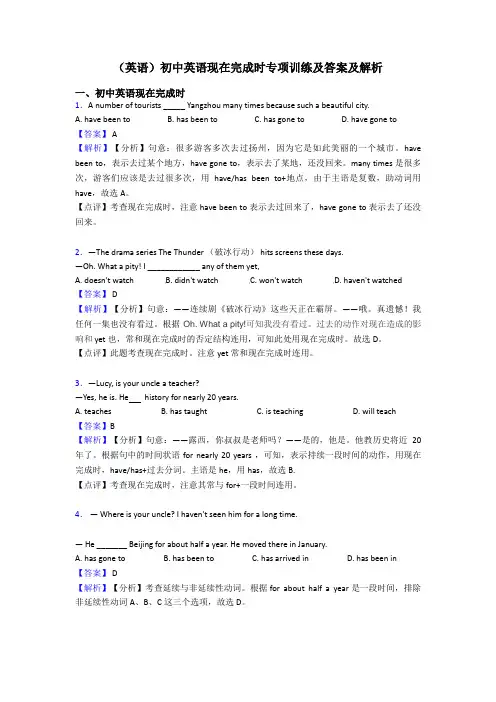
(英语)初中英语现在完成时专项训练及答案及解析一、初中英语现在完成时1.A number of tourists _____ Yangzhou many times because such a beautiful city.A. have been toB. has been toC. has gone toD. have gone to【答案】 A【解析】【分析】句意:很多游客多次去过扬州,因为它是如此美丽的一个城市。
have been to,表示去过某个地方,have gone to,表示去了某地,还没回来。
many times是很多次,游客们应该是去过很多次,用have/has been to+地点,由于主语是复数,助动词用have,故选A。
【点评】考查现在完成时,注意have been to表示去过回来了,have gone to表示去了还没回来。
2.—The drama series The Thunder (破冰行动) hits screens these days.—Oh. What a pity! I ____________ any of them yet,A. doesn't watchB. didn't watchC. won't watchD. haven't watched【答案】 D【解析】【分析】句意:——连续剧《破冰行动》这些天正在霸屏。
——哦。
真遗憾!我任何一集也没有看过。
根据Oh. What a pity!可知我没有看过。
过去的动作对现在造成的影响和 yet也,常和现在完成时的否定结构连用,可知此处用现在完成时。
故选D。
【点评】此题考查现在完成时。
注意yet常和现在完成时连用。
3.—Lucy, is your uncle a teacher?—Yes, he is. He history for nearly 20 years.A. teachesB. has taughtC. is teachingD. will teach【答案】B【解析】【分析】句意:——露西,你叔叔是老师吗?——是的,他是。
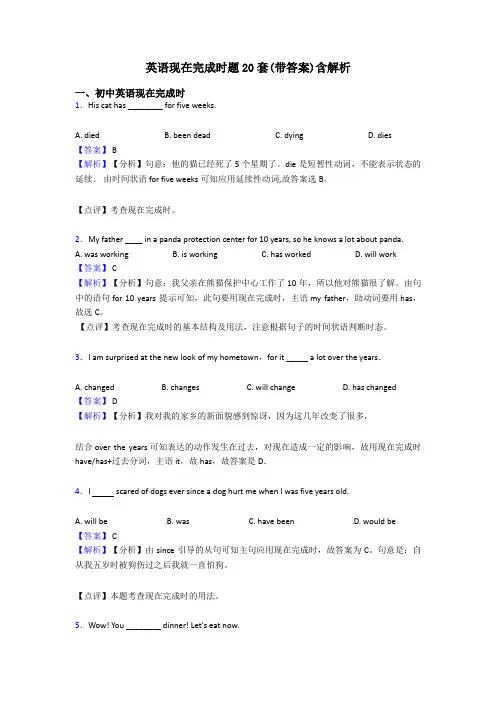
英语现在完成时题20套(带答案)含解析一、初中英语现在完成时1.His cat has ________ for five weeks.A. diedB. been deadC. dyingD. dies【答案】 B【解析】【分析】句意:他的猫已经死了5个星期了。
die是短暂性动词,不能表示状态的延续。
由时间状语 for five weeks可知应用延续性动词,故答案选B。
【点评】考查现在完成时。
2.My father ____ in a panda protection center for 10 years, so he knows a lot about panda.A. was workingB. is workingC. has workedD. will work【答案】 C【解析】【分析】句意:我父亲在熊猫保护中心工作了10年,所以他对熊猫很了解。
由句中的语句for 10 years 提示可知,此句要用现在完成时,主语my father,助动词要用has,故选C。
【点评】考查现在完成时的基本结构及用法,注意根据句子的时间状语判断时态。
3.I am surprised at the new look of my hometown,for it _____ a lot over the years.A. changedB. changesC. will changeD. has changed【答案】 D【解析】【分析】我对我的家乡的新面貌感到惊讶,因为这几年改变了很多,结合over the years可知表达的动作发生在过去,对现在造成一定的影响,故用现在完成时have/has+过去分词,主语it,故has,故答案是D.4.I scared of dogs ever since a dog hurt me when I was five years old.A. will beB. wasC. have beenD. would be【答案】 C【解析】【分析】由since引导的从句可知主句应用现在完成时,故答案为C。
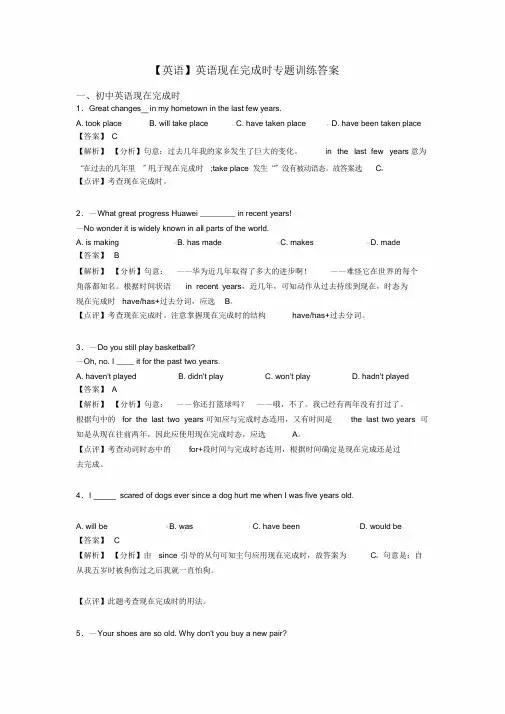
【英语】英语现在完成时专题训练答案一、初中英语现在完成时1.Great changes in my hometown in the last few years.A. took placeB. will take placeC. have taken placeD. have been taken place 【答案】 C【解析】【分析】句意:过去几年我的家乡发生了巨大的变化。
in the last few years 意为“在过去的几年里〞用,于现在完成时;take place 发生“〞没有被动语态。
故答案选C。
【点评】考查现在完成时。
2.—What great progress Huawei ________ in recent years!—No wonder it is widely known in all parts of the world.A. is makingB. has madeC. makesD. made【答案】 B【解析】【分析】句意:——华为近几年取得了多大的进步啊!——难怪它在世界的每个角落都知名。
根据时间状语in recent years,近几年,可知动作从过去持续到现在,时态为现在完成时have/has+过去分词,应选B。
【点评】考查现在完成时。
注意掌握现在完成时的结构have/has+过去分词。
3.—Do you still play basketball?—Oh, no. I ____ it for the past two years.A. haven't playedB. didn't playC. won't playD. hadn't played【答案】 A【解析】【分析】句意:——你还打篮球吗?——哦,不了。
我已经有两年没有打过了。
根据句中的for the last two years 可知应与完成时态连用,又有时间是the last two years 可知是从现在往前两年,因此应使用现在完成时态,应选A。
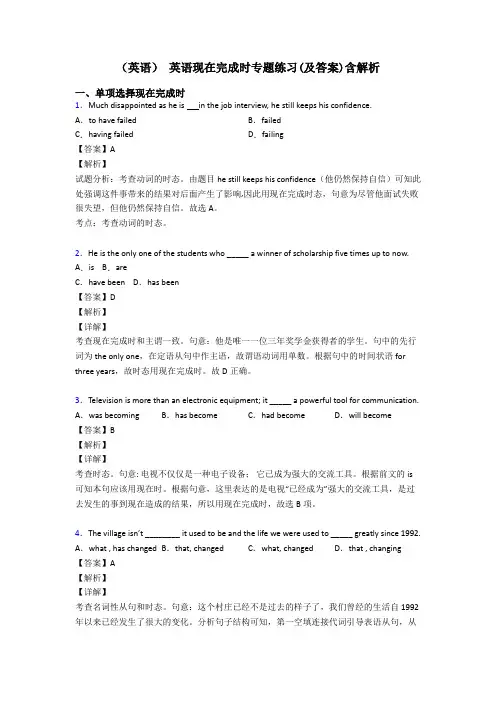
(英语)英语现在完成时专题练习(及答案)含解析一、单项选择现在完成时1.Much disappointed as he is in the job interview, he still keeps his confidence.A.to have failed B.failedC.having failed D.failing【答案】A【解析】试题分析:考查动词的时态。
由题目he still keeps his confidence(他仍然保持自信)可知此处强调这件事带来的结果对后面产生了影响,因此用现在完成时态,句意为尽管他面试失败很失望,但他仍然保持自信。
故选A。
考点:考查动词的时态。
2.He is the only one of the students who _____ a winner of scholarship five times up to now. A.is B.areC.have been D.has been【答案】D【解析】【详解】考查现在完成时和主谓一致。
句意:他是唯一一位三年奖学金获得者的学生。
句中的先行词为the only one,在定语从句中作主语,故谓语动词用单数。
根据句中的时间状语for three years,故时态用现在完成时。
故D正确。
3.Television is more than an electronic equipment; it _____ a powerful tool for communication. A.was becoming B.has become C.had become D.will become【答案】B【解析】【详解】考查时态。
句意: 电视不仅仅是一种电子设备;它已成为强大的交流工具。
根据前文的is 可知本句应该用现在时。
根据句意,这里表达的是电视“已经成为”强大的交流工具,是过去发生的事到现在造成的结果,所以用现在完成时,故选B项。
【英语】英语现在完成时专项训练及答案一、初中英语现在完成时1.It has been three years since I ______ a teacher.A. becomeB. becameC. becomingD. to become【答案】 B【解析】【分析】题意:现在完成时里,since从句里动词应用一般过去时。
故选B。
【点评】考查现在完成时和表示一段时间的时间状语的连用用法,理解题意,即可得出答案。
2.I am surprised at the new look of my hometown,for it _____ a lot over the years.A. changedB. changesC. will changeD. has changed【答案】 D【解析】【分析】我对我的家乡的新面貌感到惊讶,因为这几年改变了很多,结合over the years可知表达的动作发生在过去,对现在造成一定的影响,故用现在完成时have/has+过去分词,主语it,故has,故答案是D.3.—Lucy, is your uncle a teacher?—Yes, he is. He history for nearly 20 years.A. teachesB. has taughtC. is teachingD. will teach【答案】B【解析】【分析】句意:——露西,你叔叔是老师吗?——是的,他是。
他教历史将近20年了。
根据句中的时间状语 for nearly 20 years ,可知,表示持续一段时间的动作,用现在完成时,have/has+过去分词。
主语是he,用has,故选B.【点评】考查现在完成时,注意其常与for+一段时间连用。
4.He ___________ for ten years.A. has been marriedB. marriedC. got marriedD. has married【答案】A【解析】【分析】在现在完成时态里,当出现for+段时间时,短暂性动词必须换成延续性动词。
【英语】英语现在完成时专项习题及答案解析一、初中英语现在完成时1.-- What a nice watch! How long you it?-- For just two weeks.A. will; buyB. have; hadC. were; havingD. did; buy【答案】 B【解析】【分析】句意:“多好的一块表啊!你买了多久了?" “刚刚两周。
”根据句意可知用现在完成时,buy是瞬间动词. 不可与how long连用,故排除选项A、D:选项C是过去进行时,不符合题意。
故选B项。
【点评】考查现在完成时。
2.—Do you still play basketball?—Oh, no. I ____ it for the past two years.A. haven't playedB. didn't playC. won't playD. hadn't played【答案】A【解析】【分析】句意:——你还打篮球吗?——哦,不了。
我已经有两年没有打过了。
根据句中的for the last two years可知应与完成时态连用,又有时间是the last two years可知是从现在往前两年,因此应使用现在完成时态,故选A。
【点评】考查动词时态中的for+段时间与完成时态连用,根据时间确定是现在完成还是过去完成。
3.—How do you like Beijing, Miss Read?—I've no idea. I _____ there.A. have goneB. have beenC. haven't beenD. haven't gone【答案】 C【解析】【分析】句意:---你觉得北京怎么样,瑞得小姐?---我不知道,我没有去过那儿。
短语:have been to去过某地(已经返回);have gone to去了某地(尚未返回),根据句意,故答案为C。
【英语】初中英语现在完成时专题训练答案一、初中英语现在完成时1.His cat has ________ for five weeks.A. diedB. been deadC. dyingD. dies【答案】 B【解析】【分析】句意:他的猫已经死了5个星期了。
die是短暂性动词,不能表示状态的延续。
由时间状语 for five weeks可知应用延续性动词,故答案选B。
【点评】考查现在完成时。
2.All the skirts .They very well.A. sold out;are soldB. sell out;have soldC. have been sold out;sellD. have sold out;sell【答案】C【解析】【分析】句意:所有的裙子都卖完了,他们非常畅销。
第一空sell out“卖完”,强调裙子已经被卖完的状态,本句用现在完成时的被动语态:has/have+been+过去分词,sell 的过去分词为sold;第二空sell作“销售”解释时用主动语态,在此处表一直卖得很好的状态,用一般现在时。
故选C。
【点评】本题考查一般现在时和现在完成时的被动语态,注意sell的不同语态和用法。
3.The volunteers ________ a lot of help to the old and the young since 2010.A. offeredB. have offeredC. are offeringD. will offer【答案】 B【解析】【分析】考查时态.句意"自2010以来,志愿者们向老人和青年提供了大量的帮助.".A过去时.B现在完成时态.C现在进行时态.D一般将来时态.since+点时间通常用于现在完成时态,结构是have/has+动词的过去分词,主语是volunteers复数,用助动词have.offer的过去分词是offered.答案是B.4.My father ____ in a panda protection center for 10 years, so he knows a lot about panda.A. was workingB. is workingC. has workedD. will work【答案】 C【解析】【分析】句意:我父亲在熊猫保护中心工作了10年,所以他对熊猫很了解。
现在完成时(单选题 30题含解析)初中英语专题练习一、单选题 30题1.—When did the old man die?—In 2007. He________ for nearly nine years.A.died B.has died C.has been dead D.had died2.—Amy, you must be hungry after waiting for us for such a long time.—Don’t worry. I ________ some cookies already.A.am eating B.will eat C.was eating D.have eaten3.Not only I but also he ________ Hainan before.A.has been to B. have been to C. has gone to D. have gone to4.Great changes ________ place. Many new schools ________.A.have taken; have been opened B.take; are openC.are taken; open D.have been taken; are opened5.下列四句是“这本书我已经买了三个月了。
”的英译文,哪—句不对?________ A.I have had this book for three months. B.I have bought this book for three months. C.I bought this book three months ago. D.It is three months since I bought this book. 6.—Look! Someone __________ the classroom.—Well, it wasn’t me, I didn’t do it.A. is cleaningB. was cleaningC. has cleanedD. will clean7.—Look! That man looks like Mr. Green.—It _________ be him, for he _________ America for a month.A. can’t; has gone toB. may not; has gone toC. mustn’t; has been inD. can’t; has been in8.— Look at the blue sky! The rain ________.—Let’s go out for a walk.A.stops B.is stopping C.has stopped D.had stopped9.Actually, I have already been _______ him for two years.A.married with B.married C.married to D.marrying10.The Hunchback of Notre Dame is the best novel that I ________ these years. A.have watched B.was watching C.have seen D.have read 11.My grandparents ________ for over 50 years and they love each other very much.A.got married B.were marriedC.have been married D.have got married12.— Has your uncle arrived?— Yes. He ________ Nanjing for three days.A.has arrived in B.has gone to C.has been to D.has been in13.—I ________ back your missing notebook, here you are.—The notebook really means a lot to me. Thank you so much!A.have brought B.brought C.will bring D.was bringing14.—The woman must be our English teacher.—It ________ be. She along with another three teachers ________ to Wuhan.A.must; have been B.can’t; has beenC.may; have gone D.can’t; has gone15.—Sun Ming, is that our head teacher Miss Liu over there?—It can’t be her. She ________ to Xiamen for a meeti ng.A.has gone B.has been C.is going to D.will go to16.John, have you ________ the dictionary I lent you?A.bring B.brought C.brings D.bringing17.—Can you give me some information about Paris?—Sorry, I ________ to Paris, so I know nothing about it.A.don’t travel B.won’t travel C.haven’t travelled D.hadn’t travelled18.—It’s ten years since we ________ here.—How time flies! We ________ in China for so long.A.come; work B.came; worked C.come; will work D.came; have worked 19.—Can you tell me the ________ of the bag?—Sorry. I haven’t ________ it.A.weight; weight B.weighed; weighed C.weight; weighed D.weighed; weight 20.The old man ________ for two months, but the boy is still sad.A.died B.dead C.has died D.has been dead21.—Look! The light is still on in Helen’s office.—Maybe she _______ her work yet.A.doesn’t finish B.won’t finish C.hasn’t finished D.didn’t finish 22.—Are your parents at home now?—No. They ________ the park. They ________ there ten minutes ago.A.have gone to; went B.have gone to; goC.have been to; went D.have been to; go23.So far, I ________ two books by Liu Cixin. One is The Wandering Earth and the other is The Three-Body Problem.A.read B.have read C.was reading24.You can go to school by bike now. Your father _________ it.A.repair B.will repair C.has repaired D.is repairing25.—Where’s your father?—He’s not at home. He’s __________ Beijing for three days.A.gone to B.been to C.been in D.went to26.I am not sure how long Oliver ________.A.has joined the army B.has joined in the army C.has served the army D.has served in the army27.This shop ________ for nearly ten years.A.has opened B.has been open C.has been close D.has closed28.My parents ________ to Los Angeles before.A.were B.will be C.are D.have been29.— _________ you _________ to the USA? —No, not yet.A.Did…go B.Are…going C.Have…been D.Have…gone30.—Have scientists found any life on Mars?—No, they ________ any living things on any other plane till now.A.are discovering B.didn’t discover C.have n’t discovered D.discovered【参考答案】一、单选题 30题1.C【解析】句意:——那个老人什么时间死的?——在2007年。
(英语)中考英语此刻达成时专项训练及答案一、初中英语此刻达成时1.Hehasstudiedinourschool__________.A.sincefiveyearsB.forfiveyears C.forfiveyearsagoD.infiveyears【答案】 B【分析】【剖析】句意:他已经在我们学校学习五年了。
hasstudied是此刻达成时,和for+段时间连用,since+过去时间和此刻达成时连用,in+段时间和一般未来时连用,应选B。
【评论】考察时间状语。
依据句意选出正确的时间状语。
2.—Doyoustillplaybasketball?—Oh,no.I____itforthepasttwoyears.A.haven'tplayedB.didn'tplayC.won'tplayD.hadn'tplayed【答案】A【分析】【剖析】句意:——你还打篮球吗?——哦,不了。
我已经有两年没有打过了。
依据句中的forthelasttwoyears可知应与达成时态连用,又有时间是thelasttwoyears知是从此刻往前两年,所以应使用此刻达成时态,应选A。
【评论】考察动词时态中的for+段时间与达成时态连用,依据时间确立是此刻达成仍是过去达成。
可3.—HowdoyoulikeBeijing,MissRead?—I'venoidea.I_____there.A.havegoneB.havebeenC.haven'tbeenD.haven'tgone【答案】 C【分析】【剖析】句意:---你感觉北京怎么样,瑞得小姐?---我不知道,我没有去过那儿。
短语:havebeento去过某地(已经返回);havegoneto去了某地(还没有返回),根据句意,故答案为C。
【评论】考察短语辨析,划分havebeento与havegoneto,理解句子,依据语境判断答案。
(英语)英语现在完成进行时专题训练答案及解析一、初中英语现在完成进行时1.My friends from the mainland to me that they find the city's subway cars are "too old" compared with what they pay for subways in Beijing.A. complainedB. is complainingC. was complainingD. have been complaining【答案】 D【解析】【分析】句意:我来自大陆的朋友一直在向我抱怨,他们发现城市里的地铁和他们在北京支付的地铁相比太老了。
由句子结构可知,含有宾语从句的复合句,从句谓语动词are,用的是一般现在时,主句强调动作的延续性和反复性,要用现在完成进行时,故选D。
【点评】考查现在完成进行时。
注意根据主从句的时态关系确定正确的时态。
2.—Look, Jim is talking to his friend under the tree.—It _______ be him. He has _______ back to Canada.A. can’t; goneB. can’t; beenC. may not; beenD. mustn’t; gone【答案】 A【解析】【分析】考查情态动词表推测及现在完成时的用法。
一方面,表示推测语气时,can’t意为“不可能”;may not意为“可能不是”;must不用于否定句;另一方面,“have/has gone to+地点”意为“去了某地”,表示不在说话人这儿;“have/has been to +地点”表示“去过某地”。
句意为“——看,吉姆和他朋友在树下谈话。
——不可能是他。
他已经回加拿大了。
”故选A。
3.—Why is your foreign teacher’s Chinese so good?—Because he China for eight years.A. has gone toB. has been toC. has come toD. has been in【答案】D【解析】【分析】句意为:--为什么你的外教的中文那么好?--因为他来中国已经8年了。
【英语】初中英语现在完成时专题训练答案一、初中英语现在完成时1.A number of tourists _____ Yangzhou many times because such a beautiful city.A. have been toB. has been toC. has gone toD. have gone to【答案】 A【解析】【分析】句意:很多游客多次去过扬州,因为它是如此美丽的一个城市。
have been to,表示去过某个地方,have gone to,表示去了某地,还没回来。
many times是很多次,游客们应该是去过很多次,用have/has been to+地点,由于主语是复数,助动词用have,故选A。
【点评】考查现在完成时,注意have been to表示去过回来了,have gone to表示去了还没回来。
2.I ________ an invitation to the concert. I can't wait to go.A. receiveB. will receiveC. was receivingD. have received【答案】D【解析】【分析】句意:我已经收到音乐会的邀请,我等不及要去了。
由句意得知我已经收到去音乐会的邀请函,动作已完成造成的影响是我等不及要去,要用现在完成时,故答案选D。
【点评】考查动词时态。
根据题目所给语境推断出应使用的时态。
3.—Do you still play basketball?—Oh, no. I ____ it for the past two years.A. haven't playedB. didn't playC. won't playD. hadn't played【答案】A【解析】【分析】句意:——你还打篮球吗?——哦,不了。
我已经有两年没有打过了。
根据句中的for the last two years可知应与完成时态连用,又有时间是the last two years可知是从现在往前两年,因此应使用现在完成时态,故选A。
【点评】考查动词时态中的for+段时间与完成时态连用,根据时间确定是现在完成还是过去完成。
4.I scared of dogs ever since a dog hurt me when I was five years old.A. will beB. wasC. have beenD. would be【答案】 C【解析】【分析】由since引导的从句可知主句应用现在完成时,故答案为C。
句意是:自从我五岁时被狗伤过之后我就一直怕狗。
【点评】本题考查现在完成时的用法。
5.—Your shoes are so old. Why don't you buy a new pair?—Because I all my money on an MP5.A. spendB. have spentC. am spendingD. was spending【答案】 B【解析】【分析】因为把所有的钱都花在MP5上,所以没钱买鞋。
强调过去发生的动作对现在的影响,应用现在完成时,故选B。
【点评】考查现在完成时的用法,强调过去发生的动作对现在造成的影响。
6.—Where is your father?— .A. He has been to ShanghaiB. He has been in ShanghaiC. He has gone to ShanghaiD. He have been to Shanghai【答案】C【解析】【分析】句意:-你的父亲在哪儿?-他去上海了。
Have been to去过某地(已回);have been in在……;have gone to去了某地(未回)。
本题中父亲是人们在找的人,所以是去了某地,还没回来,用have gone to。
主语he是三人称单数,用has gone to。
故选C。
【点评】本题考查现在完成时。
以及Have been to;have been in;have gone to三个短语的词义和用法。
7.My parents for twenty years by the time I was 15.A. marriedB. had marriedC. had been marriedD. had got married【答案】 C【解析】【分析】for twenty years“二十年”.为表一段时间的状语,要求谓语动词具有持续性。
而在所给选项中,只有be married表示结婚状态,具有延续性,故选C。
【点评】本题考查非延续性动词与延续性动词的转换。
8.—They say there is a new restaurant near here.—Yes, and it ______ for more than a week.A. has been openB. openC. is openingD. opens【答案】 A【解析】【分析】句意:——他们说在这附近有一个新的餐馆。
——是的,它已经开了一个多星期了。
根据 for more than a week ,可知用现在完成时,have/has been done,故选A。
【点评】考查现在完成时,注意识记其标志词。
9.He ___________ for ten years.A. has been marriedB. marriedC. got marriedD. has married【答案】A【解析】【分析】在现在完成时态里,当出现for+段时间时,短暂性动词必须换成延续性动词。
get married需换成be married。
故选A。
【点评】该题考查的是对现完时态中的短暂性动词与延续性动词动词的掌握,这一块内容是中考的重难点,考试频率占时态考查题的一半以上。
学生必须牢记这两种词的转换及转换条件。
10.—Where is Catherine? I haven't seen her for days.—She Wuhan. She'll be back next week.A. has gone toB. has been toC. have gone toD. have been to【答案】 A【解析】【分析】句意:——Catherine在哪里?我好几天没见她。
——她已经去武汉了。
她将下周回来。
主语是she,所以用has,排除C、D。
A.已经去了某地,在去的路上,还没有回来;B.已经去过某地,表示去了某地,并且回来了。
根据She'll be back next week.她下周回来可知现在还没有回来,故选A。
【点评】考查短语辨析,注意平时识记其区别,理解句意。
11.—I'm sorry for being late.—Never mind. The meeting ______for only 5 minutes. This way, please.A. has begunB. has endedC. has been on【答案】 C【解析】【分析】句意:——对不起,我迟到了。
——没关系.会议只开了5分钟,请这边走。
for+段时间,通常用于现在完成时态,结构是have/has+动词的过去分词,begin和end都是短暂性动词,不能用于现在完成时态中表示动作或状态的延续,因此A,B不正确.has been on"在进行,开着(的状态)",故选C【点评】现在完成时表示延续性的状态。
12.—Look! Your teacher Miss White is over there.—No, it can't be her. She ______ to Beijing.A. has goneB. has beenC. wentD. will go【答案】A【解析】【分析】句意:--看!你的老师怀特小姐在那边。
--不,那肯定不是她。
她去了北京。
A. has gone去了某地,表示该人不在说话地点; B. has been去过某地,表示主语曾经去过某地,有这种经历;C. went过去式,去;D. will go将来时态,将要去。
根据前面的否定猜测,可知怀特小姐去了北京,故选A。
【点评】考查固定搭配have gone to。
13.——Where is Mr. Wang?——He together with his students ________ Zhuyuwan Park.A. has gone toB. have gone toC. has been toD. have been to【答案】 A【解析】【分析】句意:—王老师在哪里?—他同他的学生去了Zhuyuwan公园。
A. has gone to去了,没在这里。
主语是单数;B. have gone to去了,没在这里。
主语是复数;C. has been to去过,没在那里;主语是单数;D. have been to去过,没在那里;主语是复数。
本句He是主语,together with his students是介词短语,做定语不是主语,所以用has。
王老师去公园了不在这里,所以用has gone to。
故选A。
【点评】考查主谓一致和短语的用法。
14.Mike used to be a top student, but he behind since he lost himself in computer games.A. fellB. has fallenC. wasD. has been【答案】 D【解析】【分析】句意为“Mike过去是尖子生,但自从迷上电子游戏以来成绩落后了”。
由since可知but后的主句用现在完成时,瞬间动词fall不能和since引导的时间状语从句连用,故用延续性动词be。
故选D。
【点评】本题考查现在完成时中非延续性动词和延续性动词的转换。
15.The Greens many places of interest since two years ago.A. has visitedB. have visitedC. visitedD. will visit【答案】 B【解析】【分析】句意:自两年前开始,格林一家参观了许多名胜。
since引出的时间状语从句,强调主句谓语从过去某时一直延续到现在,主句用现在完成时态,the Greens格林一家,表示复数含义,作主语,谓语用复数形式。
故选B。
16.Mike began to work in the factory in 2013.He there for four years.A. is workingB. was workingC. worksD. has worked【答案】D【解析】【分析】句意:迈克在这里工作已经4年了。